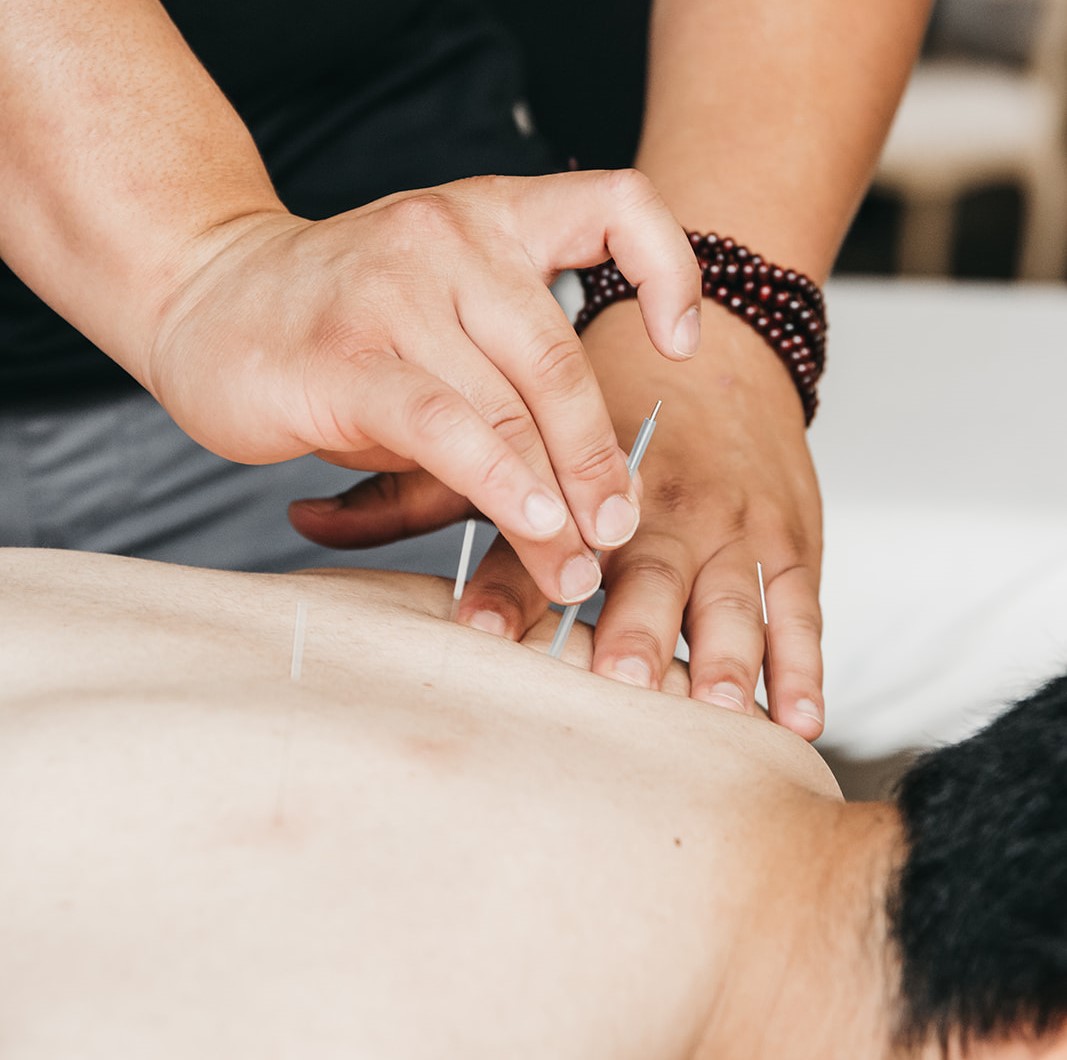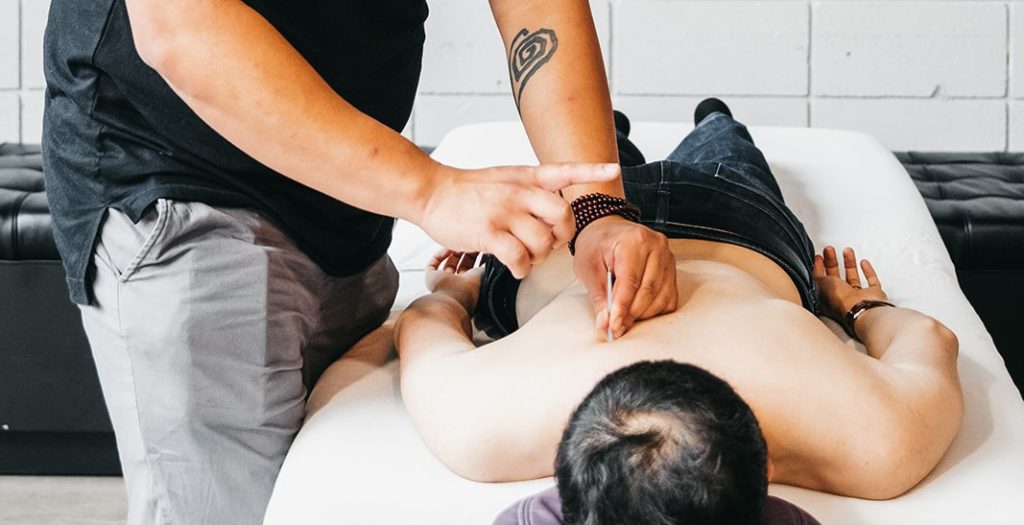When it comes to acupuncture, many think about it in regard to pain relief. After all, many studies have shown that the practice is effective for back pain. And while it’s true that it’s been used as pain management for thousands of years—there’s a lot more to it than that.
Now, acupuncture is being used as a tool in conjunction with other modalities to treat Generalized Anxiety Disorder, Post Traumatic Stress Disorder (PTSD), and more. But does that mean it’s right for you?
In this guide, we’ll help you understand what acupuncture is, how it’s generally used, the symptoms of trauma, and how acupuncture works to alleviate some of these symptoms.
What is Acupuncture?
Acupuncture, at a granular level, is the process of inserting tiny, sterile needles into your skin at specific points around the human body, called acupuncture meridians. These locations are chosen strategically based on your specific needs, and will instruct the body to begin the process of endorphin release and nervous system regulation.
Historically, acupuncture started as a Traditional Chinese Medicine used to treat a variety of ailments. By using these techniques, the practitioner can better balance your Qi – or life force energy. The practice has roots as far back as 100 BCE, when it was described as a procedure in The Yellow Emperor’s Classic of Internal Medicine.
Acupuncture is recognized by the World Health Organization (WHO) as a primary treatment for many different disorders, from the musculoskeletal to gastrointestinal.
Benefits of Acupuncture:
In more recent decades, studies have looked into the effectiveness of acupuncture as a treatment. In many cases, acupuncture is prescribed with a combination of other treatments for an additional benefit.
By using acupuncture, you may experience the following benefits:
- Muscle tension relief
- Reduction in chronic pain
- Sleep improvements
- Improvement in digestion and circulation
- Anxiety reduction
- A greater sense of well-being.

Because of those benefits, acupuncture enjoys diverse use in the medical field. The National Institutes of Health (NIH) has shown, through studies, that acupuncture may be effective for the following conditions:
- Headaches
- Nausea
- Body aches and pain
- Carpal tunnel syndrome
- Osteoarthritis
- Addiction
- Fibromyalgia
- Stress and Anxiety Disorders
- PTSD
Symptoms of Trauma
When it comes to trauma, there are plenty of ways it can manifest within the body – and it varies from person to person. These are the most common symptoms for those who have experienced traumatic events:
- Physical responses: Headaches, digestive issues, general fatigue, sweating, and a racing heart.
- Emotional responses: Anger, irritability, fear, sadness, confusion, hopelessness, anxiety, and guilt are all common emotions.
- Intrusive thoughts: This can be flashbacks, reliving traumatic events, or you can’t stop thinking about what happened.
- Nightmares: These are recurrent, vivid, disturbing dreams often of the traumatic event itself.
- Avoidance: This is when you seek to avoid triggering places, activities, or people.
- Memory loss: Amnesia or the inability to remember periods of time.
- Negative perceptions: This can be a negative perception of self or the world around you.
- Isolation: You may feel unable to connect with other people and form relationships.
- Hypervigilance: Always being aware of perceived threats and can’t relax.
- Insomnia: The inability to sleep easily at night.
- Lack of focus: Constant distractions and the inability to stay in the present.
How Trauma Therapy Can Help:
When it comes to those who are exposed to trauma, there are different types, like acute trauma and chronic trauma. Acute trauma is caused by a single stress event; whereas chronic trauma stems from repeated exposure to highly stressful events.
In both cases, the most common treatment is Cognitive Behavioral Therapy (CBT) or medication like antidepressants. However, more and more medical professionals are recommending acupuncture as well to help people who experience symptoms of trauma.
In fact, a 2019 study of those involved in a large earthquake in Italy found that acupuncture improved both their mental and physical symptoms related to the traumatic event. Over 54 percent of patients had reduced anxiety, depression, and insomnia; and 60 percent saw improvements in their pain symptoms.

Utilizing Acupuncture as a Trauma Therapy in Edmonton
Today, acupuncture is being used increasingly as a tool for trauma therapy. Since there is no one-size-fits-all solution to coping with symptoms of trauma, a combination approach is often taken, as this is generally far more effective than one tool on its own.
How Acupuncture as a Trauma Therapy Works: The Mind-Body Connection
Recently, newer studies focus on how acupuncture can be used for anxiety or stress disorders. For example, this study from 2020 outlines how acupuncture can be used to treat PSTD. But what’s the reasoning behind it?
From the perspective of science, we can look at the Polyvagal Theory. In essence, scientists hypothesize that our nervous system has evolved to help us deal with traumatic events. Since acupuncture involves stimulating your nervous system to release endorphins and regulate the sympathetic and parasympathetic nervous systems, it can help with treating nervous system-specific concerns, which can help regulate pain and help our bodies to rest.
From the perspective of philosophy and from Traditional Chinese Medicine, the body is a reflection of the mind. When we take time to care for our body with lifestyle changes, acupuncture, and other modalities such as Reiki – this will reflect in the mind and allow us better clarity and to be more present within our bodies. The mind and body want to work in tandem with each other, and the more attention we pay to caring for them, the more success we’ll see in re-establishing the mind-body connection.
Ikigai Integrative: Experts in Trauma Therapy in Edmonton
Overall, there are a lot of uses for acupuncture. Today, it’s become a popular tool in trauma therapy in Edmonton to help patients reduce pain, lower stress and anxiety, and improve their mood. We’ve seen firsthand how it works with our clients.
To recap, acupuncture can help with:
- Regulating the autonomic nervous system to reduce muscle tension, digestive disturbances, and overall activation of these areas.
- Optimizing the parasympathetic nervous system to help calm the mind and allow the body to rest and revitalize.
- The above points help to harmonize the mind-body connection, which allows you to become more present and attuned to your body.
- Addressing muscle imbalances caused by traumatic injury or emotional distress and internalization.
As trauma therapists in Edmonton, we believe in treating people as individuals with an integrative approach. When we put this treatment philosophy into action, this could look like a highly individualized psychotherapy and acupuncture-focused treatment plan – with the ultimate goal of restoring the mind-body connection.
Our team at Ikigai Integrative is always there to help you on your journey to recovery.
Want to get in touch with us? Connect with us via Instagram or book an appointment today!

